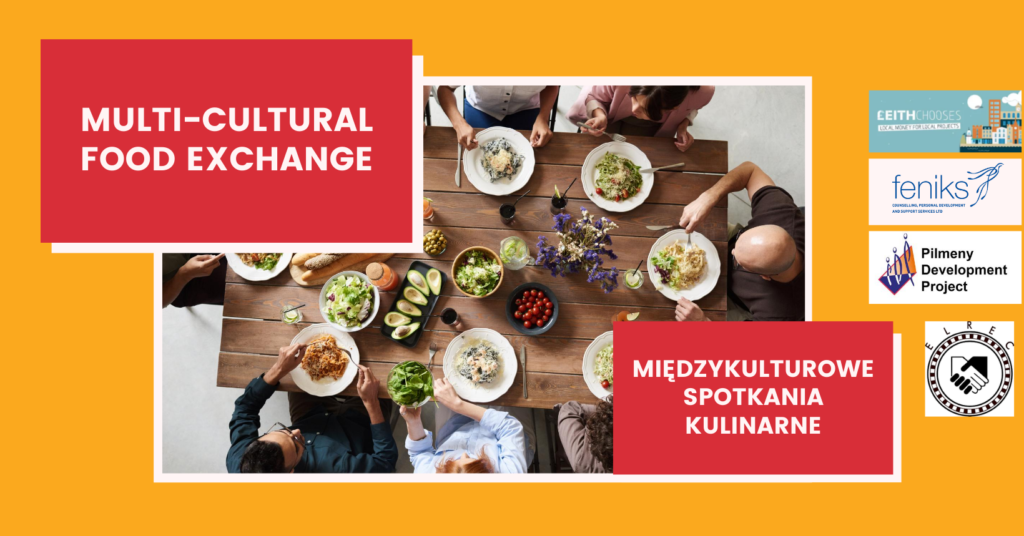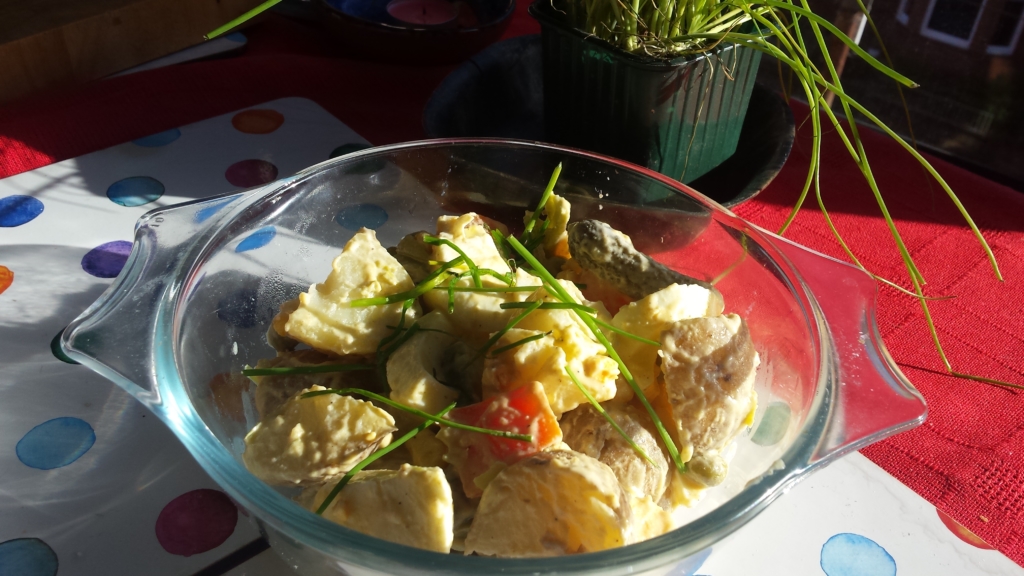Feniks Multi-Cultural Food Exchange + Polish Vegetable Salad


For this second installment of Many Voices Many Kitchens I had the pleasure to talk to Gosia at Leith-based charity Feniks about their recent online Multi-Cultural Food Exchanges, the inherent power of food to connect between cultures, and a delicious polish vegetable salad.
SWK: In your own words, can you describe Feniks and how the Multi-Cultural Food Exchange became part of your work?
Feniks: We’re a charity which looks to support the Eastern-European community through projects, services and events, especially the Polish community, as they’re the largest migrant group from that region of the world here. We run various groups, including one for Polish people aged 50 plus. Very often people from this age group are at a high risk of loneliness, so the aim is really to prevent social isolation. Often, they come to Scotland to take care of grandchildren and while they do have family connections they may not have other social opportunities or access to any kind of peer group. So we created that in 2014 and it quickly became really active, with loads of people taking part in events together and, even more importantly, then building solid friendships so that they could call or meet each other beyond the group.
At some point I spoke to the group and they said that they wished to get to know people from other ethnic groups and cultures who lived in Edinburgh. It’s one thing to be integrated within your own cultural community, but if you face language barriers or don’t have friends from other communities then you can still feel very isolated. So they had a real hunger to get to know more people. So we thought about how to do a project to bring people from various ethnic groups living in Leith together, and that’s how we came up with the Multi-Cultural Food Exchange! We took part in £eith Chooses, which was a community fund where people who live, study, work or volunteer in Leith could vote and decide projects to receive money. This year around we were one of them!
SWK: Congratulations!
F: Thank you! The vote was the day after Brexit, so it was really important to a lot of people in the community to experience that show of solidarity and that people still wanted to support and get to know each other.
But going back to the project itself, the initial idea for a cooking exchange came about when members of the Pilmeny Development Project asked our group to teach them to make dumplings. Which we were more than happy to do and we also learned from it just how valuable food can be to social engagement.
We also have other activities planned during the overall project, including art workshops run by local artists. We’d really like to use art as a tool for multi-cultural exchange, using influences from different countries and traditions. So that part of it will be run in the New Year!
SWK: What made you choose to do the food exchanges before the art ones?
F: I think that the cooking exchange was a bit easier! Organising art workshops takes a lot more preparation, especially as we really wanted to get local artists involved. It takes a bit more conceptual thinking. Talking about food is pretty straightforward in comparison as it’s based on knowledge that we all already have about our own cultures, therefore it’s just easier to share! Everyone knows about their own food, so that means that we don’t have to get a specialist in, and that instead everyone can just share their own personal experiences, while also gaining knowledge from others at the same time.
Also, honestly food is just always exciting! People get excited about sharing food!
SWK: How did you encourage different people to get involved?
F: We have partners with whom we’d already worked with on other projects so that helped a lot. The Pilmeny Development Project aided in involving participants from a mainly Scottish background and ELREC, who work with a lot of diverse communities, introduced Iranian and Chinese participants to the project.
SWK: And how did you find this process of organising and co-ordinating people from different communities and projects?
F: In terms of general work and communicating it was easy, it was a small project really and all the organisations involved knew each other so it was pretty straightforward! And then when we actually all got together for the sessions it was such a nice experience. I mostly work with the Polish community, so it was great to see that they can have so much to offer to the wider local landscape while also being able to learn so much from others as well! Most of the time, our Polish participants are still limited to socialising within their linguistic community so to be able to widen that group was wonderful.
The biggest challenge for us was the language barrier. Some of our members have quite basic English language skills, but we still wanted the sessions to run as smoothly as possible, which meant that we didn’t want to have to translate every spoken English word into Polish, which would’ve taken double time! So we ran English lessons prior to the meetings and also involved volunteers to type translations into the chat box function during the event.
We also challenged our own group to present Polish food to everyone else in English, which took a lot of practice beforehand but afterwards it made everyone feel really proud of themselves and happy as well!
SWK: How did each group decide what food to present?
F: Well there were three sessions altogether. The first was about Scottish food, then we had a joint Iranian-Chinese cuisine session and finally the Polish one. Each group decided on their own what food they wanted to present and share with others. We didn’t cook together during the sessions themselves either, instead we just talked about different countries and foods and traditions. Then afterwards we would share a chosen recipe with participants and they could try to make it for themselves at home and share it with our Facebook group – which was so nice as well! I made Scottish shortbread and Iranian adasi!
SWK: Amazing! How did they go?!
F: The shortbread was… very bad! As a vegan I tried to adapt the Scottish recipe but it unfortunately didn’t really work out for the best! The adasi was much better because it was vegan in the first place! And actually it was so good and now it’s my new go-to way of cooking lentils so that makes me happy too!
SWK: Now I want adasi! How was the rest of the community feedback from participants?
F: Really good! I’ve had emails from people saying how grateful they feel for it and that they’re looking forward to further workshops, which is a great sign. I think for our Polish participants as well it was so valuable for them to know that they are able to do something like present about food in English.
SWK: How did you find the process of suddenly having to adapt the workshops to an online environment?
F: It was a bit of a shame, the idea initially was that people would be able to sit together and just have chats and really make lots of informal connections and that’s just harder to do online as opposed to in a live setting where everyone can chat away while peeling potatoes together! At the same time, I really enjoyed it and felt excited to bring these groups together, so while it wasn’t the same I do think it still worked well and that it did still encourage social connection, so we achieved our goal in that sense. We were being encouraged by our funders to adjust our project to the current situation, so thanks to that we took it forward. Obviously, talking about food is different from making food and eating together, but it still worked!
SWK: What do you hope for the future of the project?
F: Well I think the value of what we’ve done really is to encourage people to meet in one place together and be able to talk to each other. We want to have as much face-to-face and real interaction as possible. It’s one of the reasons we kept the groups small, so that it’d be easier to build bonds between people. So we hope that those bonds will only strengthen over time.
As for the future, we’ll be doing the three art workshops in a similar way and also we’ll be working together with the Living Memory Association to organise reminiscence workshops which will encourage people to share their memories of growing up in different countries. We’ll use old objects from the Wee Museum of Memory and then ask people about their associations, which will be great!
Hopefully when it’s possible we’ll also be able to get everyone together face-to-face and to really meet each other – I think it’s great that here in Leith there are so many groups dedicated to supporting individual communities, but I also think it would be nice if we could all mix a bit more, especially if it’s over a meal!


Each week I’m also asking the people I talk to if they have a particular recipe they’d like to share with me, which I then go off and try to cook myself! Gosia kindly provided the following:
POLISH VEGETABLE SALAD
Ingredients:
boiled potatoes 5 pcs. (salad)
boiled carrots 2 pcs.
boiled celery 1 pc.
boiled leek – green part
boiled chicken eggs 6pcs.
pickled cucumbers
green peas 1 can (200g)
sweetcorn 1 can (200g)
homemade mayonnaise mustard 3tbsp
herbal pepper to taste
salt to taste
chives for decoration
cherry peppers as a side dish
Method:
Chop potatoes, carrots, celery, leek, eggs, cucumbers. Mix it together with the rest of the ingredients. Add mayonnaise and spices. Chill in the fridge before serving. Enjoy 🙂

Such a brilliant idea to bring people together from different backgrounds through food!